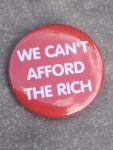 This blog is about inequality and particularly the rise of the rich over the last 30 years, and the problems they pose. It’s a follow-up to my book Why We Can’t Afford the Rich, picking up on some of the issues it raises, but also ones that go beyond it. Things like:
This blog is about inequality and particularly the rise of the rich over the last 30 years, and the problems they pose. It’s a follow-up to my book Why We Can’t Afford the Rich, picking up on some of the issues it raises, but also ones that go beyond it. Things like:
- – how the rich get rich
- – how they siphon off wealth from others
- – how major economic inequalities arise
- – how the rich dominate politics
- – what’s the impact of their spending?
- – what have the rich got to do with climate change?
- – what’s wrong with the usual defences of the rich?
The posts and links are all about what we need to deal with in creating societies that are more equal, fair, conducive to well-being, and sustainable. Though the book takes a mainly economic angle, cultural changes in society are very much part of the bigger picture, so I’ll be making posts on these.
So why can’t we afford the rich? Here’s the short answer:
Their wealth is mostly dependent ultimately on the production of goods and services by others and siphoned off through dividends, capital gains, interest, rent and speculation, and much of it is hidden in tax havens. They are able to dominate economic life and dominate politics and the media, so their special interests and view of the world come to restrict what democracies can do. Their consumption is excessive and wasteful and diverts resources away from the more needy and deserving. Their carbon footprints are grotesquely inflated and many have an interest in continued fossil fuel production and economic growth, threatening the planet.
Whether you agree, wholly or partly, or disagree vehemently, the arguments that back up these claims are in the book.
Like the book, this website and blog is for anyone who’s concerned about growing inequality, about the way society is going and the future of the environment, or about the failure of our political class to do anything to stop things getting worse.
And like the book, it’s intended for general rather than just academic readers. But I will give references where appropriate to provide evidence and sources. If you want to look at more academic articles relating to the blog’s topics, I’ll be posting links from time to time.
Andrew Sayer, Lancaster, UK.
Header photo: epSos.de Creative Commons



